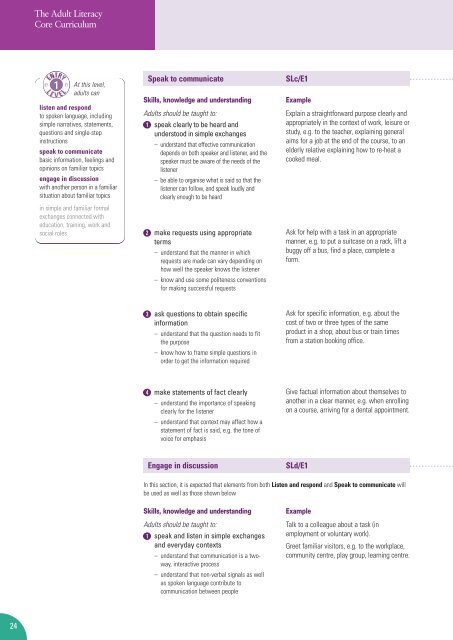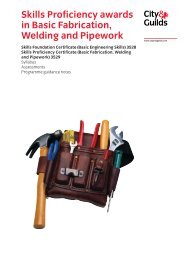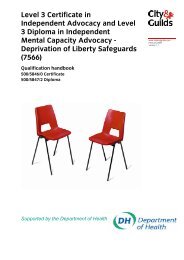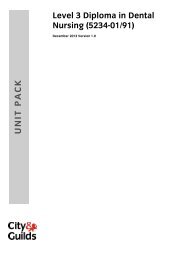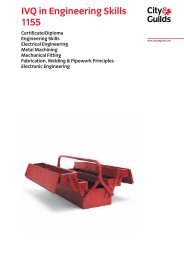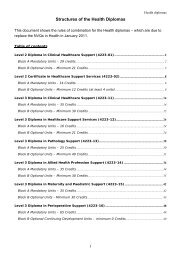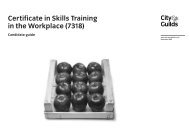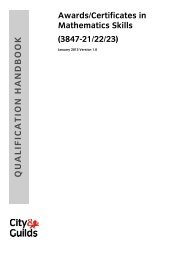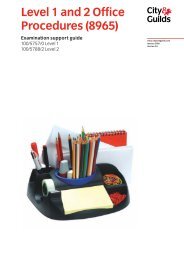Adult Literacy Core Curriculum - Nationally developed Skills for Life ...
Adult Literacy Core Curriculum - Nationally developed Skills for Life ...
Adult Literacy Core Curriculum - Nationally developed Skills for Life ...
You also want an ePaper? Increase the reach of your titles
YUMPU automatically turns print PDFs into web optimized ePapers that Google loves.
24<br />
The <strong>Adult</strong> <strong>Literacy</strong><br />
<strong>Core</strong> <strong>Curriculum</strong><br />
At this level,<br />
adults can<br />
listen and respond<br />
to spoken language, including<br />
simple narratives, statements,<br />
questions and single-step<br />
instructions<br />
speak to communicate<br />
basic in<strong>for</strong>mation, feelings and<br />
opinions on familiar topics<br />
engage in discussion<br />
with another person in a familiar<br />
situation about familiar topics<br />
in simple and familiar <strong>for</strong>mal<br />
exchanges connected with<br />
education, training, work and<br />
social roles<br />
Speak to communicate SLc/E1<br />
<strong>Skills</strong>, knowledge and understanding<br />
<strong>Adult</strong>s should be taught to:<br />
1 speak clearly to be heard and<br />
understood in simple exchanges<br />
– understand that effective communication<br />
depends on both speaker and listener, and the<br />
speaker must be aware of the needs of the<br />
listener<br />
– be able to organise what is said so that the<br />
listener can follow, and speak loudly and<br />
clearly enough to be heard<br />
2<br />
3<br />
4<br />
make requests using appropriate<br />
terms<br />
– understand that the manner in which<br />
requests are made can vary depending on<br />
how well the speaker knows the listener<br />
– know and use some politeness conventions<br />
<strong>for</strong> making successful requests<br />
ask questions to obtain specific<br />
in<strong>for</strong>mation<br />
– understand that the question needs to fit<br />
the purpose<br />
– know how to frame simple questions in<br />
order to get the in<strong>for</strong>mation required<br />
make statements of fact clearly<br />
– understand the importance of speaking<br />
clearly <strong>for</strong> the listener<br />
– understand that context may affect how a<br />
statement of fact is said, e.g. the tone of<br />
voice <strong>for</strong> emphasis<br />
<strong>Skills</strong>, knowledge and understanding<br />
<strong>Adult</strong>s should be taught to:<br />
1<br />
speak and listen in simple exchanges<br />
and everyday contexts<br />
– understand that communication is a twoway,<br />
interactive process<br />
– understand that non-verbal signals as well<br />
as spoken language contribute to<br />
communication between people<br />
Example<br />
Engage in discussion SLd/E1<br />
Explain a straight<strong>for</strong>ward purpose clearly and<br />
appropriately in the context of work, leisure or<br />
study, e.g. to the teacher, explaining general<br />
aims <strong>for</strong> a job at the end of the course, to an<br />
elderly relative explaining how to re-heat a<br />
cooked meal.<br />
Ask <strong>for</strong> help with a task in an appropriate<br />
manner, e.g. to put a suitcase on a rack, lift a<br />
buggy off a bus, find a place, complete a<br />
<strong>for</strong>m.<br />
Ask <strong>for</strong> specific in<strong>for</strong>mation, e.g. about the<br />
cost of two or three types of the same<br />
product in a shop, about bus or train times<br />
from a station booking office.<br />
Give factual in<strong>for</strong>mation about themselves to<br />
another in a clear manner, e.g. when enrolling<br />
on a course, arriving <strong>for</strong> a dental appointment.<br />
In this section, it is expected that elements from both Listen and respond and Speak to communicate will<br />
be used as well as those shown below<br />
Example<br />
Talk to a colleague about a task (in<br />
employment or voluntary work).<br />
Greet familiar visitors, e.g. to the workplace,<br />
community centre, play group, learning centre.


